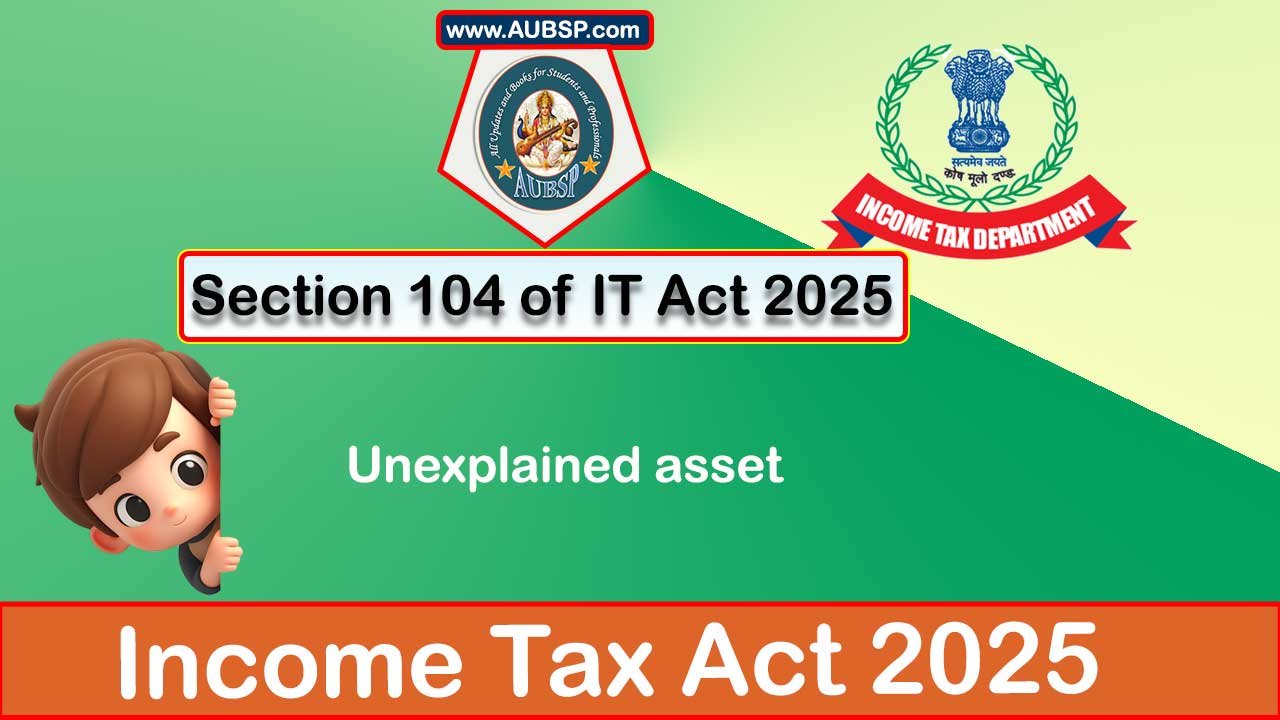Unexplained asset
[Section-104 as per the Income Tax Act, 2025 (this Act) w.e.f. 1st April, 2026.]
Section 104(1) of Income Tax Act 2025
104(1) Where in any tax year, any asset has been found to be owned by or belonging to the assesse which is not recorded in the books of account, if any, maintained by such assessee, or the Assessing Officer finds that the amount of such asset exceeds the amount recorded in such books of account where the asset is found recorded, and the assesse––
- (a) offers no explanation about the nature and source of acquisition of such asset, or such excess amount, as the case may be; or
- (b) the explanation offered by the assessee, is not satisfactory in the opinion of the Assessing Officer,
then, the value of such asset, or such excess amount, as the case may be, shall be deemed to be the income of the assessee of the tax year in which such asset has been found to be owned by, or belonging to, the assessee.
Section 104(2) of Income Tax Act 2025
104(2) In this section, “asset” includes money, bullion, jewellery, virtual digital asset or other valuable article.
FAQs on Section 104 of Income Tax Act 2025
What is an unexplained asset under the Income Tax Act, 2025?
An unexplained asset refers to any asset found to be owned by or belonging to an assessee which is not recorded in their books of account, or where the recorded amount is less than the actual value, and for which the assessee fails to provide a satisfactory explanation.
From when is Section 104 of the Income Tax Act, 2025 effective?
Section 104 is effective from 1st April, 2026.
Under which section of the Income Tax Act, 2025 are unexplained assets covered?
Unexplained assets are covered under Section 104 of the Income Tax Act, 2025.
What happens if an asset is found that is not recorded in the books of account?
If an asset is found that is not recorded, and the assessee either offers no explanation or an unsatisfactory explanation, the value of the asset will be treated as the assessee’s income for that tax year.
What if the asset is recorded in the books but at a lower amount than its actual value?
If the amount recorded is less than the actual value and no satisfactory explanation is given, the excess amount will be deemed as income of the assessee for that tax year.
Who determines whether the explanation given by the assessee is satisfactory?
The Assessing Officer determines whether the explanation provided by the assessee is satisfactory.
In which tax year will the value of the unexplained asset be treated as income?
The value will be treated as income of the tax year in which the asset is found to be owned by or belonging to the assessee.
Does the assessee have an opportunity to explain the nature and source of the asset?
Yes, the assessee has the opportunity to explain the nature and source of acquisition of the asset or the excess amount.
What is included in the definition of ‘asset’ under Section 104(2)?
The term “asset” includes money, bullion, jewellery, virtual digital assets, or other valuable articles.
Are virtual digital assets considered unexplained assets?
Yes, virtual digital assets are included in the definition of asset under Section 104(2).
If an assessee fails to record virtual digital assets, can it be deemed as income?
Yes, if virtual digital assets are not recorded or properly explained, their value can be deemed as income under Section 104.
What is meant by ‘other valuable article’ in the definition of asset?
‘Other valuable article’ refers to any valuable item not specifically listed but similar in nature to money, bullion, jewellery, or virtual digital assets.
Is bullion considered an asset for the purpose of Section 104?
Yes, bullion is specifically included in the definition of asset under Section 104(2).
What is the consequence of failing to provide a satisfactory explanation about an asset?
The consequence is that the value of the asset or the excess amount will be treated as the assessee’s income for that tax year.
Does the assessee need to maintain books of account to be covered under Section 104?
Section 104 applies whether or not books of account are maintained; it applies when an asset is found owned or belonging to the assessee and not properly explained.
What is the role of the Assessing Officer under Section 104?
The Assessing Officer assesses the ownership of the asset, evaluates the explanation provided, and determines whether the asset or excess amount should be deemed as income.
Is there a requirement that the asset must be newly acquired in the tax year?
No, Section 104 focuses on when the asset is found, not necessarily when it was acquired.
Can an asset already owned in earlier years but found now be covered under Section 104?
Yes, if it is found during the current tax year and not properly recorded or explained, it can be covered under Section 104.
Will partial explanation about the asset be sufficient to avoid its value being added as income?
Only if the explanation is satisfactory in the opinion of the Assessing Officer; otherwise, the value will still be deemed as income.
Does Section 104 require physical possession of the asset?
It requires that the asset is found to be owned by or belonging to the assessee, not necessarily in their physical possession.

